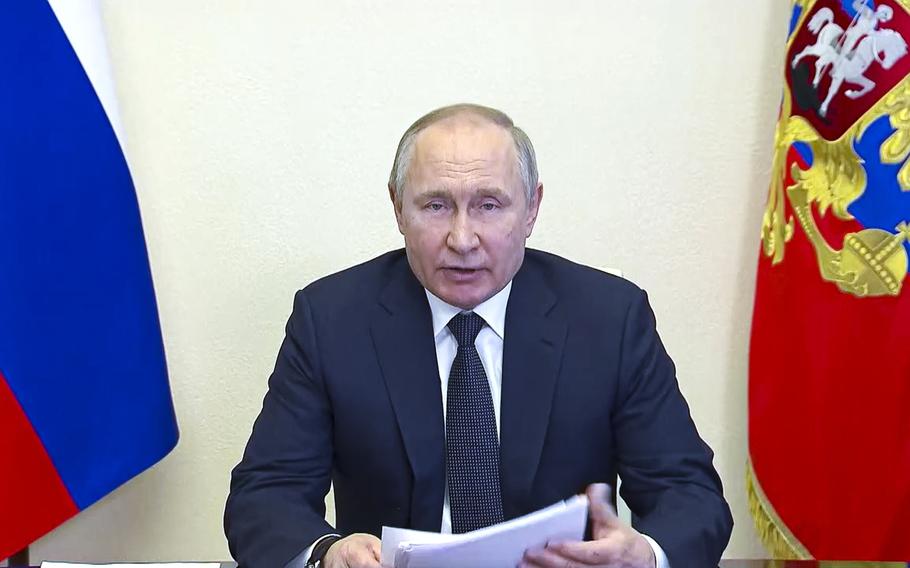
In this photo taken from video released by the Russian Presidential Press Service, Russian President Vladimir Putin speaks via videoconference at the Novo-Ogaryovo residence outside Moscow, Russia, Wednesday, March 16, 2022. (Russian Presidential Press Service via AP)
Anatoly Chubais, one of the economic reformers in the years after the Soviet Union and author of Russia’s unpopular privatization program, quit as presidential envoy on sustainable development, the Kremlin confirmed Wednesday, after reports he left the country because of his opposition to Russia’s war on Ukraine.
Chubais, the most senior official to cut ties with the Kremlin after the invasion of Ukraine, was one of the few 1990s Russian reformers who survived throughout Putin’s presidency, although he had little influence in recent years.
Chubais was not a member of Putin’s dwindling inner circle of hard-line security and military chiefs, known as the siloviki, or men of power. But his departure underscores the alarm felt by many in Russia’s comfortable urban classes at Putin’s war and his mounting witch hunt for traitors and “fifth columnists.”
Kremlin spokesman Dmitry Peskov said Chubais had resigned but did not confirm he had left the country. “Yes. Chubais resigned of his own free will. But whether he left or did not leave, that’s his business,” Peskov told the Interfax news agency.
Ruslan Edelgeriev, President Vladimir Putin’s representative on climate issues, also confirmed Chubais’s resignation in comments to RIA Novosti.
Tass news agency reported that Chubais had left Russia, while Kommersant newspaper published a photograph of him withdrawing cash from an automated teller machine in Istanbul. Bloomberg News agency, which first reported the news, reported he had departed Russia because of his opposition to Putin’s war.
Chubais’s wife, Avdotya Smirnova, signed an open letter from philanthropists to Putin last month opposing the war.
Chubais was unpopular in Russia for his role in helping push through the notorious “loans-for-shares” privatization deal in the mid-1990s, which spawned Russia’s class of ultrarich oligarchs. Under the deal, a group of bankers loaned money to the government, picking up the jewels of Russian industry at throwaway prices in return, including Vladimir Potanin, who grabbed a large share of Norilsk Nickel.
In the early 1990s, Chubais was part of a team of reformers associated with economist Yegor Gaidar, the latter who served as deputy prime minister and finance minister but stepped down before the loans-for-shares deal.
Last week, Chubai, 66, posted an oblique post on Facebook to commemorate Gaidar’s death in 2009. He said he had been wrong about the strategic risks faced by Russia, an apparent reference to the nation’s current direction under Putin.
Chubais said it seemed “an entire era” had passed since Gaidar’s death.
“In our discussions about the future of Russia, I did not always agree with him. But it seems that Gaidar understood the strategic risks better than I did, and I was wrong,” Chubais wrote.
He recently posted a tribute on his Facebook page to Boris Yeltsin. On Feb. 27 on Facebook, Chubais marked the anniversary of the death of prominent pro-democracy politician Boris Nemtsov, who was gunned down near the Kremlin in 2015 after harshly criticizing Putin’s annexation of Crimea from Ukraine. (Facebook and Instagram have both been blocked in Russia and a Moscow court Tuesday banned parent company Meta as an “extremist” organization.)
Chubais, who like Putin was from St. Petersburg, reportedly gave Putin his first Kremlin job in 1997 and supported his rise to power in 1999.
In 2008, Chubais was appointed to the Russian Nanotechnology Corp., a state nanotechnology firm that was supposed to develop cutting edge technologies, later renamed Rosnano. Chubais was dismissed in December 2020 amid friction over unprofitable projects and inefficiency. Instead Putin created a role for him as envoy on sustainable development.
Last week, Arkady Dvorkovich, former Kremlin aide and ex-deputy prime minister, stepped down as head of the state-backed Skolkovo technology fund after facing intense criticism for speaking out against the invasion.